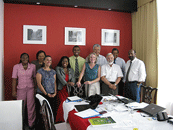Workshop on the Development of an Online Module for the Leaders in International Health Program Edmundo Granda Ugalde
 On 8-9 October, 2009 a workshop was held in Kingston, Jamaica to commence the development of an online module on Chronic Diseases and Trade, which will be used for the Leaders in International Health Program Edmundo Granda Ugalde (LIHP) 2010.
On 8-9 October, 2009 a workshop was held in Kingston, Jamaica to commence the development of an online module on Chronic Diseases and Trade, which will be used for the Leaders in International Health Program Edmundo Granda Ugalde (LIHP) 2010.
The objective of the LIHP is to strengthen the capacity of countries in the region to understand, act upon and positively influence the international determinants of health, to promote their national interests, and to achieve intersectoral health agreements in international environments, at all times guided by the principle of greater global equity in health.
As part of its decentralized format, the LIHP includes a series of online modules. In addition to core modules related to the social determinants of health, primary health care, and international cooperation and health diplomacy, the Program has also developed problem-based modules that enable participants to analyze key public health issues from an international health perspective, examining the international factors/determinants that impact them as well as the international (bilateral, regional, global) agreements, policies and treaties that exist (or could potentially be advocated for) to ameliorate their negative effects. The proposed module on Chronic Diseases and Trade is being developed in response to this critical issue throughout the Caribbean and Latin America, and will be offered to LIHP participants in 2010 along with other modules on such diverse topics as Conflicts, Violence and Human Rights; Nutrition, Food Trade and Development; Access to Medicines, Trade and International Agreements; and Climate Change and Development.
Reflecting the module’s intersectoral nature, the workshop included professionals from the Institute of Population Health, University of Ottawa, the Caribbean Food and Nutrition Institute (CFNI), and the Pan American Health Organization, as well as representatives from the Ministry of Health and Environment, Ministry of Industry, Investment and Commerce, and Ministry of Agriculture of Jamaica. The participants were very enthusiastic about participating in the initial stages of development for the module and expressed their continuing support and collaboration for the initiative. The development of the final module will also include the collaboration of the Institute of Nutrition of Central America and Panama (INCAP) and experts on trade issues from the Caribbean Community (CARICOM). This initiative is supported through funds made available to PAHO by the Canadian International Development Agency (CIDA).
